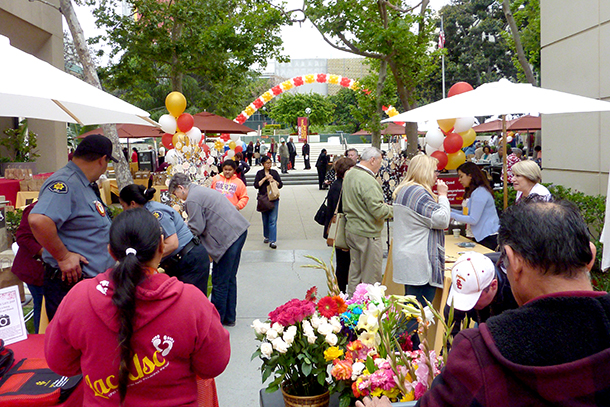A cancer diagnosis is a lesson in living with uncertainty. Patients and survivors know that feeling, that loss of control, very well — it becomes their daily life.
For Casey O’Connell, MD, a clinical cancer researcher at the USC Norris Comprehensive Cancer Center who specializes in hematology, that fact was one she knew, but only really learned last summer, when she transitioned from being a doctor to being a caregiver and patient advocate for her mother.
“The most difficult lesson I’ve learned over the past 20 years or so as a physician, is that while I can do my best to learn everything possible about the diseases I treat, the treatments I give and the side effects they may cause, I cannot control another human being’s destiny,” she said.
O’Connell, an associate professor of clinical medicine at the Keck School of Medicine of USC, shared the emotional story of her struggles to get the proper diagnosis and care for her mother’s cancer, during USC Norris’ 29th annual Festival of Life, a gathering of hundreds of cancer survivors, patients, caregivers, family and friends. The event was held June 1 on the Health Sciences Campus.
“My mother seemed infuriatingly uninterested in controlling this cancer she had, even by learning the names of the treatments or the statistics or by asking the questions, everything I’m used to doing every day,” O’Connell said. “But what she showed me is that she was really interested in living her life and writing her cancer story the way only she could … and now I realize, she’s writing the cancer story, not me, not the doctors. And it’s beautiful because it’s her story, and she already knew that the story was the only thing she could control.”
In addition to O’Connell’s remarks as the physician speaker, the Festival of Life included performances by the Bayou Brass Band, Trojan Marching Band and magician Harvey Simpson, guided by Master of Ceremonies W. Martin Kast, PhD, professor of molecular microbiology and immunology, obstetrics and gynecology, and urology at the Keck School. Testimonials from cancer survivors included Phuong Gallagher, a patient advocate who urged the attendees to share their stories.
“You never know who it will help,” she said, adding that each person she has met through patient support groups lives on in her and the stories they told her have inspired her in her continued fight against cancer.
Jean Richardson, DPH, professor emeritus in the Keck School’s Department of Preventive Medicine, shared the story of her diagnosis and treatment from the perspective of a scientist as well as a patient.
“I wonder, why have I had such a stunning response (to treatment)? Was it the support of family and friends? Was it exercise? Was it feeling safe and comfortable with those who were taking care of me? Was it prayer? Was it the chemo and surgery, or was it all of these together? Right now, the exact reasons are unknown. But I believe it is knowable,” she said.
“In the past 50 years there have been many breakthroughs in cancer therapy that has turned it around and made many cancers curable. … I have confidence in the scientists who work to develop new therapies. Research is incremental, one finding builds on another. I want to say to the researchers I know, first of all, thank you for the work that you do, and second, I want to say keep working, try harder. Keep at it, the answers will come. And when the answers come, patients around the world will benefit and cancer will be curable and we will all rejoice.”
The 30th annual Festival of Life will be held June 6, 2020.
— Melissa Masatani


